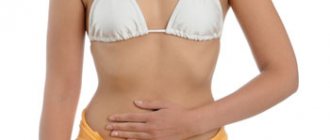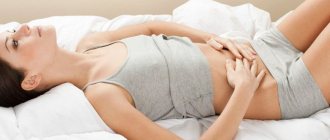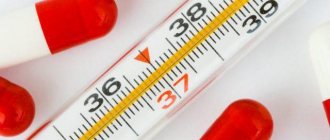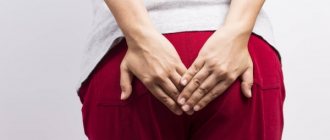Every month, in women of reproductive age, an egg is released from the follicle, ready for fertilization. In medicine, this process is usually called ovulation. Due to the hormonal surge at this time, some ladies experience a number of atypical symptoms. One such condition is diarrhea during ovulation. Of course, not everyone develops this symptom, but only 10% of women, but nevertheless, you should not endure unpleasant sensations; you need to know how to deal with them.
Ovulation and diarrhea
There is no direct connection between these processes and stool disorder cannot be considered a symptom of ovulation. Diarrhea during this period can be caused by any of the factors influencing pathological changes in the gastrointestinal tract, resulting in diarrhea. However, ovulation can trigger diarrhea, due to the development of irritable bowel syndrome. The fact is that in some women the pain during this period can be very sharp and severe, stabbing or cramping in nature and lasting for several days. The pain is caused by contractions of the uterus and fallopian tubes, which in turn affect increased muscle contractions of the intestines. The cause of loose stool in this case is the activation of intestinal motility.
Diarrhea can be caused by blood coming from the ovary when the follicle ruptures, which, when absorbed in the intestines, causes irritation of the intestinal mucosa. Another cause of diarrhea may be irritation caused by the reduced distance between the ovaries and the woman's abdominal wall. If diarrhea continues after ovulation and is pronounced, and even more so if it is accompanied by fever and vomiting, then you need to consult a doctor to determine the cause. In all other cases, the woman does not need to take measures to secure the stool.
Every month, in women of reproductive age, an egg is released from the follicle, ready for fertilization. In medicine, this process is usually called ovulation. Due to the hormonal surge at this time, some ladies experience a number of atypical symptoms. One such condition is diarrhea during ovulation. Of course, not everyone develops this symptom, but only 10% of women, but nevertheless, you should not endure unpleasant sensations; you need to know how to deal with them.
When to see a doctor?
Anyway. In a healthy woman, the menstrual cycle is asymptomatic, with, at most, minor mood swings. Any noticeable manifestation of ovulation is already a disease. Most often, its causes are to blame for a lack of estrogen, which is treated by taking oral contraceptives based on it.
But if signs such as diarrhea, diarrhea with blood, nausea and vomiting, severe mood swings appear, it is worth talking to a gynecologist about an examination, because the cause needs to be found and eliminated.
Causes of intestinal upset during ovulation
Due to little awareness of a woman’s reproductive function, many doubt whether diarrhea can occur during ovulation because, in fact, the intestines and genitals are different, unrelated systems in the body. We are accustomed to the fact that diarrhea is caused by food poisoning or infectious diseases, and it is very difficult to believe that there may be any other causes of the disorder. In fact, there are several of them, and for a certain number of women, diarrhea during ovulation is a fairly common situation.
It is known that the female cycle is divided into two phases. In the second phase, there is a huge hormonal surge, which should prepare the body for fertilization. Under the influence of hormones, changes in the functioning of other organs can occur. For example, diarrhea during ovulation can cause increased intestinal contractions. Under the influence of the same hormones, the intestinal walls contract intensively and the food consumed by the woman is not absorbed properly. The intestines push it out before the inherent moisture in it has time to be absorbed. The intestinal muscles contract intensely while the egg moves through the fallopian tubes. As soon as it enters the uterus, the diarrhea goes away and the gastrointestinal tract works at a normal pace.
Signs of pregnancy
After fertilization of the egg, the body reacts with several signs at once, but in women this manifests itself differently. Some complain of fatigue, others complain of bowel movements, and others complain of nausea.
You will get complete confidence by analyzing a number of signs that prove the likelihood of pregnancy. Let's roughly divide them into:
After analyzing everything, you can decide whether to visit a gynecologist so that the doctor can visually assess the condition of the cervix, which changes appearance after fertilization.
Ways to eliminate dysfunction
If diarrhea often occurs during ovulation, be sure to consult a gynecologist and gastroenterologist. There is a possibility that the disruption of the intestines was caused not by the phase of the menstrual cycle, but by something else. This is especially true in cases where diarrhea is noted before ovulation. Depending on the cause of the disease, as well as the degree of severe symptoms of diarrhea, the doctor may prescribe the following medications:
- Drugs that reduce intestinal tone - Imodium and Lorepamide;
- Antimicrobial substances - Sulgin, Tetracycline, Interix, Tinnacomp;
- Medicines for restoring microflora - Linex, Bifiform, Bactisuptil;
- Sorbents – Kaopectate, Enterodes, Polysorb.
Before ovulation, diarrhea can also cause pain for a woman. To relieve them, it is recommended to use No-shpu, Tamipul or Spazmalgon. The selection of medications should be carried out by a doctor. Illiterate therapy can only worsen a woman’s condition and disrupt the natural process of ovulation.
Folk remedies for diarrhea
If it is not possible to visit a doctor during an exacerbation of diarrhea, but you know for sure that intestinal dysfunction is caused by ovulation, you can try to get rid of diarrhea on your own. Among the folk recipes that can stop diarrhea during ovulation in the shortest possible time, the following have worked well:
- potato starch is added to a glass of boiling water, stirred and consumed 1 glass three times a day;
- rye bread is soaked in warm water until completely dissolved and the resulting liquid is consumed in 10 sips before each meal;
- If you do not have stomach problems, you can eliminate diarrhea with a single dose of 50 g of vodka and salt. Salt is mixed in vodka and drunk in one gulp. It is important not to get carried away with therapy. No matter what useful purposes alcohol is used for, it can have a negative impact on your body, causing a loss of coordination and consciousness;
- Diarrhea during ovulation will be eliminated by a decoction of bird cherry bark. This plant has astringent and tonic properties. The bird cherry bark is brewed in boiling water for 20 minutes, covered with a lid and left for half an hour. Drink 5 teaspoons before meals. You should drink no more than 20 spoons per day, as bird cherry can cause allergic reactions in hypersensitive people.
Drug treatment
The most common way to get rid of constipation and diarrhea is pharmacology. The first rule is that you cannot self-medicate. Medications should only be prescribed by your attending physician, because if the choice is incorrect, addiction or even an allergic reaction is possible. This is why medical regimens involve combining different types of medications, provided they are used for a short period of time.
To treat diarrhea, the doctor may use:
- antiseptics with intraintestinal action, as well as antibiotics (Levomycetin, Metronidazole, Amoxicillin);
- enterosorbents (Activated carbon, Smecta, Polysorb);
- peristalsis - drugs that slow down wave-like contractions of the walls of the rectum (Immodium, Loperamide, Enterobene);
- probiotics (Linex, Bifikol, Bifidumbacterin);
- herbal medicines that have a tanning and astringent effect (blueberry fruit, pomegranate, burnet root).
Causes of diarrhea
Most often, people experience diarrhea when they eat low-quality, spoiled foods and dirty water. But stool disorders are not always of an infectious nature. In the case of diarrhea during ovulation, several factors may be the cause.
Increased intestinal motility
In the middle of the cycle, the intestinal tract works intensively. Its muscles push out incoming food so vigorously that the water it contains does not have time to be completely absorbed and is excreted from the body. Hence, loose stools, as if during intoxication - then suppression of the absorption of substances becomes a protective mechanism. But in this case, hormones are to blame. During this period, their main task is to release the egg into the fallopian tubes, but they also influence other organs. Therefore, while the muscles of the fallopian tube are working to move the egg into the uterus, the intestinal walls are trying to expel its contents.
Change in appetite
Some women notice that their food preferences change on different days of their cycle. Those on a diet feel this especially clearly. If immediately after menstruation everything goes like clockwork, then closer to the middle of the cycle, some require significant volitional efforts to withstand even the usual restrictions. The reason lies in the same hormones. Estrogen not only promotes the maturation of the egg, but also increases the body's sensitivity to insulin, which affects the feeling of hunger. If you follow the lead of appetite, the intestines simply cannot cope with the load, and therefore will be forced to get rid of the excess along with the liquid.
Possible signs of pregnancy
Possible signs indicate gestation, but may also indicate the presence of diseases. They appear early. Requires confirmation in conjunction with other available factors.
Some pregnant women can name the day when conception occurred, despite the absence of the slightest guess. Others do not notice obvious changes, even when friends tell them about a possible pregnancy.
What is considered probable indicators:
- delay of menstruation;
- changes in the mammary glands - enlargement, release of colostrum;
- enlarged uterus, soft tissue consistency, short-term increase in tone during palpation, softening of the isthmus;
- positive test performed more than twice.
The first two points have already been discussed above. What remains is the breast and the growth of the uterus.
Many breasts hurt and become larger before menstruation. With the onset of menstruation, the symptoms disappear. If your period is late, your breasts continue to become full and sore, you can buy a test. The inclusion of lobules of the mammary gland in the work begins in the first days after conception. The amount of liquid released is small, so the appearance of drops on the laundry may not be noticed. Colostrum begins to be released more intensely from the 13th week.
In the early stages, only a doctor can determine how enlarged it is. The pregnant woman does not notice this. The size of the fetus is so small that it will not cause growth of the uterus and abdomen. It’s another matter when the uterus becomes full due to increased blood flow. But this increase is also small. If you are curious whether the uterus is growing or not, then go to the gynecologist.
Reliable signs
Reliable signs of the presence of an embryo:
- fetal movements observed by the doctor during examination;
- listening to the heartbeat;
- Ultrasound reveals the fetal skeleton;
- During manual examination, large parts of the fetus are palpated.
The fetus begins to move from the 8th week. At this time, it does not touch the walls of the uterus, so the woman cannot feel the baby’s movements. Motor activity is felt from 18 to 20 weeks.
A woman’s weight matters—thin women feel movement earlier. The location of the placenta on the anterior wall of the uterus helps reduce sensitivity, so sensations arise later.
Bone tissue can be seen already in the 5th week - this is the vertebral arch. By the end of the second month, the limbs and bones of the skull and cartilaginous tissue are distinguished. At 12–14 weeks, the doctor has the opportunity to assess the degree of bone tissue development and exclude intrauterine pathologies.
During an external examination of the fetus, the doctor determines the position of its large parts - the head and back, the presenting part. The head in the second trimester may be at the top - at the bottom of the uterus. When the arms are positioned sideways, the backrest is determined by its wide surface. On the opposite side of the abdomen are the limbs. For a short period of time, the limbs may not be palpable.
You can listen to your heart beat after the 6th week. High-precision sensitive equipment is used - a transvaginal sensor of an ultrasound machine. When examined with a transabdominal sensor, the fetal heartbeat can be heard at 8–9 weeks.










